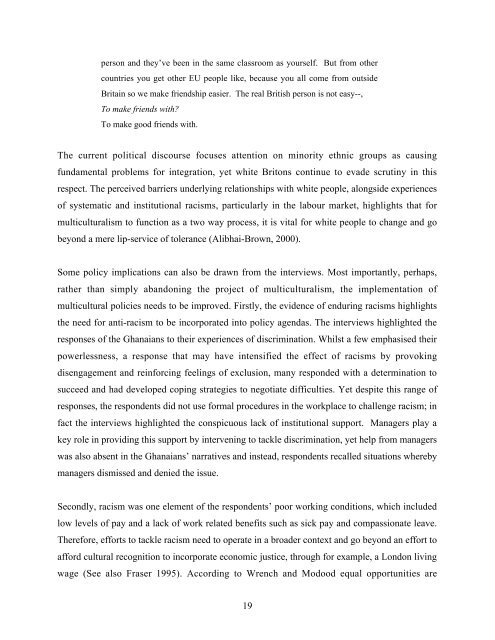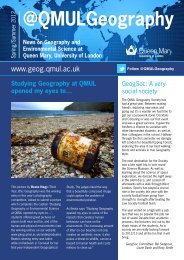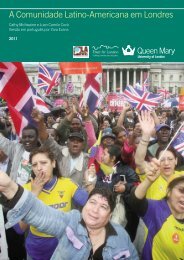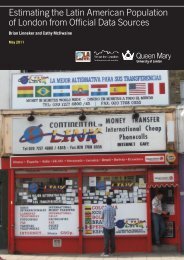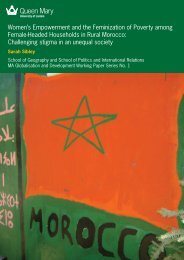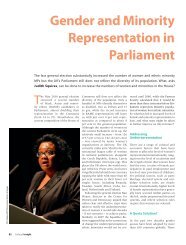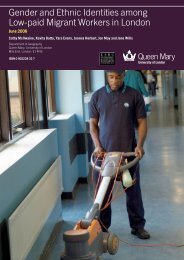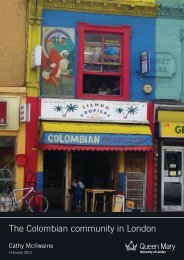Multiculturalism at work: The experiences of Ghanaians in London
Multiculturalism at work: The experiences of Ghanaians in London
Multiculturalism at work: The experiences of Ghanaians in London
- No tags were found...
You also want an ePaper? Increase the reach of your titles
YUMPU automatically turns print PDFs into web optimized ePapers that Google loves.
person and they’ve been <strong>in</strong> the same classroom as yourself. But from othercountries you get other EU people like, because you all come from outsideBrita<strong>in</strong> so we make friendship easier. <strong>The</strong> real British person is not easy--,To make friends with?To make good friends with.<strong>The</strong> current political discourse focuses <strong>at</strong>tention on m<strong>in</strong>ority ethnic groups as caus<strong>in</strong>gfundamental problems for <strong>in</strong>tegr<strong>at</strong>ion, yet white Britons cont<strong>in</strong>ue to evade scrut<strong>in</strong>y <strong>in</strong> thisrespect. <strong>The</strong> perceived barriers underly<strong>in</strong>g rel<strong>at</strong>ionships with white people, alongside <strong>experiences</strong><strong>of</strong> system<strong>at</strong>ic and <strong>in</strong>stitutional racisms, particularly <strong>in</strong> the labour market, highlights th<strong>at</strong> formulticulturalism to function as a two way process, it is vital for white people to change and gobeyond a mere lip-service <strong>of</strong> tolerance (Alibhai-Brown, 2000).Some policy implic<strong>at</strong>ions can also be drawn from the <strong>in</strong>terviews. Most importantly, perhaps,r<strong>at</strong>her than simply abandon<strong>in</strong>g the project <strong>of</strong> multiculturalism, the implement<strong>at</strong>ion <strong>of</strong>multicultural policies needs to be improved. Firstly, the evidence <strong>of</strong> endur<strong>in</strong>g racisms highlightsthe need for anti-racism to be <strong>in</strong>corpor<strong>at</strong>ed <strong>in</strong>to policy agendas. <strong>The</strong> <strong>in</strong>terviews highlighted theresponses <strong>of</strong> the <strong>Ghanaians</strong> to their <strong>experiences</strong> <strong>of</strong> discrim<strong>in</strong><strong>at</strong>ion. Whilst a few emphasised theirpowerlessness, a response th<strong>at</strong> may have <strong>in</strong>tensified the effect <strong>of</strong> racisms by provok<strong>in</strong>gdisengagement and re<strong>in</strong>forc<strong>in</strong>g feel<strong>in</strong>gs <strong>of</strong> exclusion, many responded with a determ<strong>in</strong><strong>at</strong>ion tosucceed and had developed cop<strong>in</strong>g str<strong>at</strong>egies to negoti<strong>at</strong>e difficulties. Yet despite this range <strong>of</strong>responses, the respondents did not use formal procedures <strong>in</strong> the <strong>work</strong>place to challenge racism; <strong>in</strong>fact the <strong>in</strong>terviews highlighted the conspicuous lack <strong>of</strong> <strong>in</strong>stitutional support. Managers play akey role <strong>in</strong> provid<strong>in</strong>g this support by <strong>in</strong>terven<strong>in</strong>g to tackle discrim<strong>in</strong><strong>at</strong>ion, yet help from managerswas also absent <strong>in</strong> the <strong>Ghanaians</strong>’ narr<strong>at</strong>ives and <strong>in</strong>stead, respondents recalled situ<strong>at</strong>ions wherebymanagers dismissed and denied the issue.Secondly, racism was one element <strong>of</strong> the respondents’ poor <strong>work</strong><strong>in</strong>g conditions, which <strong>in</strong>cludedlow levels <strong>of</strong> pay and a lack <strong>of</strong> <strong>work</strong> rel<strong>at</strong>ed benefits such as sick pay and compassion<strong>at</strong>e leave.<strong>The</strong>refore, efforts to tackle racism need to oper<strong>at</strong>e <strong>in</strong> a broader context and go beyond an effort toafford cultural recognition to <strong>in</strong>corpor<strong>at</strong>e economic justice, through for example, a <strong>London</strong> liv<strong>in</strong>gwage (See also Fraser 1995). Accord<strong>in</strong>g to Wrench and Modood equal opportunities are19


